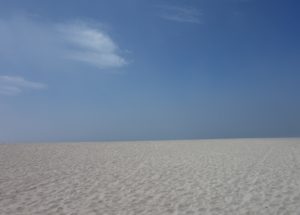 What do you see when you imagine a prophet? Do you picture a mysterious figure sitting in a cave predicting the future with riddling words? If an enigmatic seer is the first thing you think of, you’re not exactly wrong, but you might be drawing more on the stories of Greek Mythology than on the Bible. Cassandra, doomed to predict the future but never to be believed. The Oracle of Delphi foretelling the tragedy of Oedipus. Those are Greek Prophets. Prophets in the Old and New Testament are a bit different. Oh, they might predict the future every now and again, but their main function is to speak truth to power, to call the people and their leaders back to the worship of God.
What do you see when you imagine a prophet? Do you picture a mysterious figure sitting in a cave predicting the future with riddling words? If an enigmatic seer is the first thing you think of, you’re not exactly wrong, but you might be drawing more on the stories of Greek Mythology than on the Bible. Cassandra, doomed to predict the future but never to be believed. The Oracle of Delphi foretelling the tragedy of Oedipus. Those are Greek Prophets. Prophets in the Old and New Testament are a bit different. Oh, they might predict the future every now and again, but their main function is to speak truth to power, to call the people and their leaders back to the worship of God.
Biblical Prophets are rude. They’re offensive. They do outrageous things to attract attention. And Elijah, who we read about today, was a prophet through and through.
In the New Testament, you might remember that Elijah and Moses appeared with Jesus in his Transfiguration. But Elijah in particular is also sometimes associated with John the Baptist. Like John the Baptist, he was larger than life, and no friend to the powers of his day.
A little bit of background: Elijah lived about 850 years before Jesus’s birth, in a time when the Holy Land was divided between two kingdoms—Israel in the north and Judah in the south. Today’s story begins in the northern kingdom. Ahab is king, Jezebel his queen. Both are followers of the Canaanite god Baal. And Elijah has just made them both very angry indeed.
Let’s back up a few days. Elijah challenges the prophets of Baal to a contest. Elijah and the followers of Baal will each sacrifice a bull to their god, but they won’t light the sacrificial fire themselves. Instead, they’ll pray for their god to send down fire from heaven. The god who responds is the strongest god, the true God. The prophets of Baal pray with all their might, but nothing happens. Then Elijah steps forward. He soaks his offering in water to make it harder to burn, and he prays to God. And immediately fire comes down from heaven, consuming the bull and the altar and even the water surrounding it. The crowd is convinced. Elijah’s God is the true God. And, at Elijah’s urging, the crowd kills the prophets of Baal, who, remember, are also the allies of the king and queen.
That’s where today’s reading picks up. The king and queen are furious, and Elijah runs away to the southern kingdom. But he doesn’t stop there. He travels another 250 miles south, through dry and difficult land, to Mount Horeb, to the mountain where God gave the tablets of the ten commandments to Moses.
And there he encounters God. “Now there was a great wind, so strong that it was splitting mountains and breaking rocks in pieces before the Lord, but the Lord was not in the wind; and after the wind an earthquake, but the Lord was not in the earthquake; and after the earthquake a fire, but the Lord was not in the fire; and after the fire a sound of sheer silence.”
And there, in the silence, it seems, the Lord was finally to be found.
A sound of sheer silence. Older translations used the phrase “a still small voice,” but “a sound of sheer silence” seems even more evocative to me. Have you ever been alone in the desert? You really can hear the silence. With no branches to rustle in the wind, no cars driving by, no music playing, you become intensely aware of the quiet.
Elijah was not, on the whole, a quiet man. He called down fire from heaven, urged the massacre of the prophets of Baal. He spoke to crowds and faced down kings. But on Mount Horeb he found God in silence.
It’s curious that this happened on the very mountain where tradition tells us Moses received the tablets of the ten commandments. I like to think I’m pretty good at following the ten commandments, at least most of the time. I’m not in the habit of stealing or murdering, and I even try not to lie. But there’s one commandment I pretty regularly ignore, and I suspect I’m not the only one. Do you know what I’m referring to? I’m thinking of the fourth commandment: “Remember the Sabbath day and keep it holy.”
Sabbath begins in the very creation of the world. God worked, and then God rested—and so must we.
But how often do we truly rest? How often do we seek out silence? Every Friday night at sundown, Orthodox Jews turn off their phones and their televisions. They light candles. They say prayers. They eat a meal. They bless their children. And they enter into a holy time, a time set apart just as surely as a holy place would be. For twenty-four hours, they rest. When was the last time you did that?
Sabbath can feel like just one more obligation, one more appointment to put on the calendar. But Jesus said, “the sabbath was made for us, and not us for the sabbath.” Sabbath is a gift, an opportunity, and in these times when it seems harder and harder to slow down, we’d do well to remember that. I suspect it’s no accident that a noisy and busy prophet met God in silence in the very place God gave us the commandment to rest. And if we make time for silence, and for sabbath, we might encounter God more often ourselves.
Today’s reading shows us that there are times when even prophets need to seek out quiet and silence and the presence of God. Storms and earthquakes and fire will come. But in the silence of sabbath, we might just find, as Elijah did, God’s presence. God’s call. And, after we rest, the strength to go back and finish the work God calls us to do.
